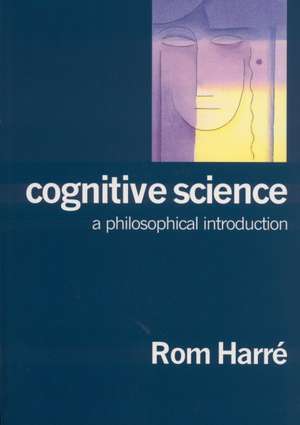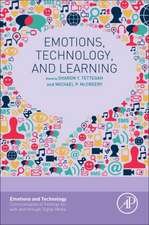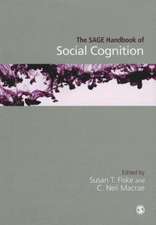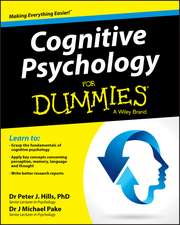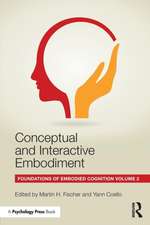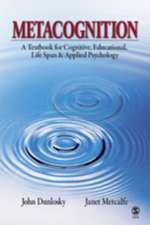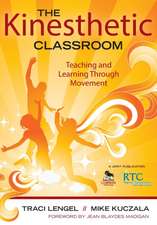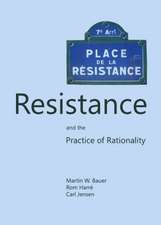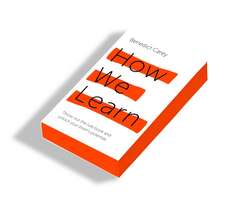Cognitive Science: A Philosophical Introduction
Autor Rom Harreen Limba Engleză Paperback – 17 feb 2002
Fluently written and well structured, this is an ideal text for students who want to gain a comprehensive view of the current state of the art with its seeming divergence into studies of meanings and studies of neurology. The book is divided into four basic modules, with suggestions for three lectures in each. The plan is related to the overall pattern of the semester programme. The reader is guided with helpful learning points, sections of study questions for review, and key readings for each chapter.
Cognitive Science: A Philosophical Introduction, with its remarkable sweep of themes, past and present, truly introduces 'the science of the mind' for a new generation of psychology students.
Cognitive Science should be indispensable reading for students at all levels taking courses in cognitive science and cognitive psychology, and useful additional course reading in other areas such as social psychology, artificial intelligence, philosophy of the mind and linguistics.
Key Points
· First major textbook to provide a link between computational, philosophical and biological models in an accessible format for students. Presents a new vision of psychology as a scientific discipline.
· Breadth of coverage - ranging from artificial intelligence, to key themes & theories in cognitive science (past and present) - language, memory, the brain and behaviour - to recent discursive and cultural theories.
· Plenty of student features to help the student and tutor including helpful learning points, study and essay questions and key readings at the end of every chapter.
Preț: 489.51 lei
Preț vechi: 604.34 lei
-19% Nou
Puncte Express: 734
Preț estimativ în valută:
93.67€ • 98.06$ • 77.50£
93.67€ • 98.06$ • 77.50£
Carte tipărită la comandă
Livrare economică 07-21 aprilie
Preluare comenzi: 021 569.72.76
Specificații
ISBN-13: 9780761947479
ISBN-10: 0761947477
Pagini: 336
Dimensiuni: 170 x 242 x 19 mm
Greutate: 0.57 kg
Ediția:First Edition
Editura: SAGE Publications
Colecția Sage Publications Ltd
Locul publicării:London, United Kingdom
ISBN-10: 0761947477
Pagini: 336
Dimensiuni: 170 x 242 x 19 mm
Greutate: 0.57 kg
Ediția:First Edition
Editura: SAGE Publications
Colecția Sage Publications Ltd
Locul publicării:London, United Kingdom
Cuprins
PART ONE: THE NATURE AND METHODS OF SCIENCE
A Science for Psychology
The Natural Sciences
Understanding Scientific Method
PART TWO: THE SEARCH FOR A SCIENCE OF HUMAN BEHAVIOUR
Psychology as the Science of Mental Substance
Psychology as the Science of Material Substance
The Beginnings of Cognitive Science
PART THREE: TOWARDS A SCIENTIFIC PSYCHOLOGY
Grammar and Cognition
Cognitive Science
The Analytical Phase
Connectionism and the Brain
PART FOUR: COGNITIVE SCIENCE IN ACTION
The Memory Machine
The Psychology of Classifying
Cognitive Disorders
A Science for Psychology
The Natural Sciences
Understanding Scientific Method
PART TWO: THE SEARCH FOR A SCIENCE OF HUMAN BEHAVIOUR
Psychology as the Science of Mental Substance
Psychology as the Science of Material Substance
The Beginnings of Cognitive Science
PART THREE: TOWARDS A SCIENTIFIC PSYCHOLOGY
Grammar and Cognition
Cognitive Science
The Analytical Phase
Connectionism and the Brain
PART FOUR: COGNITIVE SCIENCE IN ACTION
The Memory Machine
The Psychology of Classifying
Cognitive Disorders
Notă biografică
Rom Harré is a Fellow of Linacre College, Oxford and Professor of Psychology at Georgetown University, Washington, DC
Descriere
This is the first major textbook to offer a truly comprehensive review of cognitive science in its fullest sense. Ranging from artificial intelligence models of neural processes and cognitive psychology to recent discursive and cultural theories, Rom Harré offers an original yet accessible integration of the field. At its core, this textbook addresses the question `How can psychology become a science?'. The answer is based on a clear account of method and explanation in the natural sciences and how they can be adapted to psychological research.
Fluently written and well structured, this is an ideal text for students who want to gain a comprehensive view of the current state of the art with its seeming divergence into studies of meanings and studies of neurology. The book is divided into four basic modules, with suggestions for three lectures in each. The plan is related to the overall pattern of the semester programme. The reader is guided with helpful learning points, sections of study questions for review, and key readings for each chapter.
